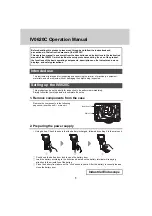
Model 4200A-SCS Parameter Analyzer Reference Manual
Section 13: LPT library function reference
4200A-901-01 Rev. C / February 2017
13-159
pulse_vlow
This command sets the pulse voltage low value.
Pulse modes
Standard
Usage
int pulse_lhigh(int
instr_id
, long
chan
, double
vlow
);
instr_id
The instrument identification code of the pulse card, such as VPU1 or VPU2
chan
Channel number of the pulse card:
1
or
2
vlow
Pulse voltage low value in volts (floating point number):
•
Fast speed:
−
5 to +5
•
Slow speed:
−
20 to +20
•
Default: 0
Details
Pulse voltage low can be set independently for each pulse card channel.
For a 50 Ω load:
•
5 V range (lower voltages and higher transitions): Pulse high and pulse low can be set from
−
5 V
to +5 V.
•
20 V range (higher voltages and lower transitions): Pulse high and pulse low can be set from
−
20 V to +20 V.
For a 1 MΩ load:
•
5 V range (high speed): Pulse high and pulse low can be set from
−
10 V to +10 V.
•
20 V range (high voltage): Pulse high and pulse low can be set from
−
40 V to +40 V.
The
pulse_range
command determines the pulse voltage range.
Set the
pulse_range
command before setting the voltage levels. When using the
pulse_range
command, changing the source range after setting voltage levels (in any pulse mode) will result in
voltage levels that are invalid for the new range setting.
As shown below, the pulse voltage low is typically set as the lower pulse voltage value. However,
voltage low can be any valid voltage value. That means pulse voltage low can be less than voltage
high. When started, the pulse transitions from voltage low to voltage high and then back to voltage
low. The voltage remains at voltage low for the remainder of the pulse period.
Figure 513: Pulse V Low and Pulse V High
















































